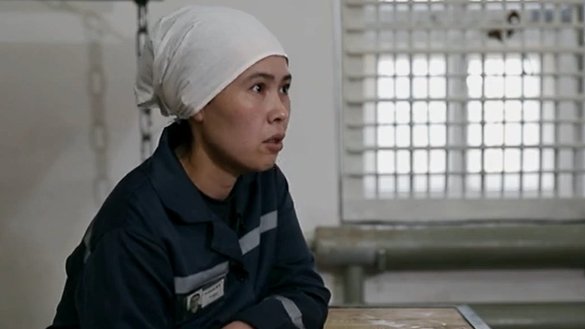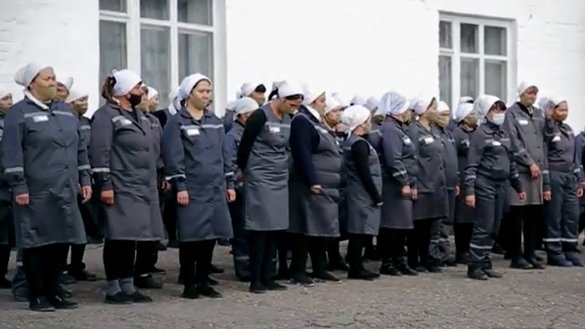ALMATY -- The Spiritual Administration of Muslims of Kazakhstan (DUMK) is airing a series of video interviews with individuals who joined the "Islamic State of Iraq and Syria" (ISIS) in Syria and were later convicted.
The initiative is part of an effort to prevent extremism in Kazakhstan.
In the interviews, posted on Kazislam.kz on August 25, imprisoned ex-militants recount how they ended up on the battlefield in Syria, barely saving themselves and their families, and returned to Kazakhstan, where they now are serving prison sentences.
In 2019, as ISIS was losing its last scrap of Syrian territory under coalition bombardments, Kazakhstan launched Operation Jusan (Bitter Wormwood), a series of flights extending into 2021. The two-year operation repatriated more than 700 Kazakhs from Syria.

A screenshot from a DUMK video shows Jazira Asanova, widow of an 'elite' ISIS fighter, who is now serving time in prison.

A screenshot from a DUMK video shows a women's building in a prison in North Kazakhstan province where Jazira Asanova is serving her sentence.
From ISIS battleground to hard labour
Almaz Ashirov fell under ISIS's sway in 2013 and decided to go to Syria and fight.
Divorced and raising his son alone, he fell for terrorist propaganda despite having a good job as a dental hygienist.
He quit his job and left his son with relatives.
"[ISIS recruiters] contended that a 'jihad' was taking place in Syria and that we had to go there to help Muslims. They posted a video of old people, women and children, who were chanting, 'Muslims of the world, where are you? Why aren't you coming [to rescue us]?'"
They said we have to answer for our actions on Judgment Day, Ashirov said.
As soon as he arrived in Syria, he realised that his actions were not helping to protect anyone. However, he still did not lay down arms.
"We fought ordinary civilians and Russian and American soldiers alike," he recalled. "That was the policy."
Ashirov ranked fairly high among the militants and would not have left until ISIS commanders for some reason called him a traitor.
"An announcement came from the leaders saying that all apostates had to be punished. There was major turmoil there at the time. Human life was worth less than a mere bullet," Ashirov said.
Ashirov escaped from Syria with the family he had formed there, a wife and four children.
In January 2018, a year before Operation Jusan's mass repatriations, he and his family reached Kazakhstan. He was sentenced to 15 years of hard labour for participation in terrorist activities.
Even now, he does not fully understand what he was fighting for, describing it as "foolishness".
Once released, he said he intends to raise his children honourably.
The 'elite' fighter's widow
Jazira Asanova returned to Kazakhstan in December 2019 through Operation Jusan and received an eight-year prison sentence for participating in terrorist activities.
She is a pariah among her cellmates, she said.
"I started praying in 2010, and a year after that, I met a man and married him. A year later, he suggested that we go to Egypt for a couple of years to study Arabic," Asanova said.
However, instead of studying in authorised language schools, she said, they studied at illegal centres in the country, where they learned Arabic and fell under the sway of pseudo-sheikhs.
One day, her husband told her that he was going to Syria to help his "Muslim brothers". Four months later, Asanova followed him and consequently ended up in a militant camp in 2013, at the height of the civil war in Syria.
Thanks to his Arabic language skills, Asanova's husband became a confidante of ISIS commanders and a member of of an "elite" combat unit.
But he was killed in an air strike.
"Just before my husband died, I told him I wanted to go home, but he refused," Asanova said.
After her husband died, Asanova had no place to go. Starving, she and her children wandered. Eventually, she and a number of other women fled to a Kurdish camp, from which she and her children were repatriated.
"I can now say with certainty that there was no religion in Syria. There can be no paradise where there is war. It's my fault that I'm here [in prison], separated from my children," she said.
'Deprogramming' radicals in prison
Deradicalisation is more effective in prison than outside because inmates generally are seeking rehabilitation, said Asylbek Izbairov, an Almaty-based specialist on preventing extremism.
"However, much depends on their inner beliefs," Izbairov told Caravanserai. "If a believer has repented for choosing a misguided ideology ... prison is a place where he can be re-educated."
"But if he thinks the punishment is unfair, he'll become resentful and his extremist inclinations will become stronger," he added.
Prison authorities have to avoid making extremists pariahs, which complicates their rehabilitation, he said, warning that convicted extremists have a penchant for converting common criminals.
In the world outside prison, devout Muslims can be radicalised because they find emotional inspiration lacking in their worship, said Rustam Saduyev, director of the Kokshetau office of Akniyet, an NGO specialising in outreach to and rehabilitation of former extremists.
ISIS and other destructive movements offer them what they are yearning for, he told Caravanserai.
Saduyev, though, finds encouragement in the preaching of Almaty cleric Yerlan Akatayev, who attracts former radicals to his sermons at the Aryn-Kazhy mosque.
The "charismatic" Akatayev "emphasises spiritual morality rather than religious doctrines or Islamic law", Saduyev said.
"He gives emotional inspiration to Muslims," said Saduyev. "Former supporters of radicalism are listening to his sermons. This is a way for them to become familiar with traditional Islamic preaching."








